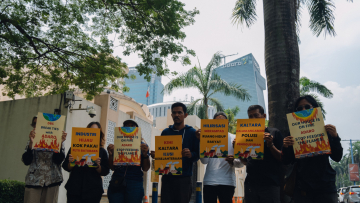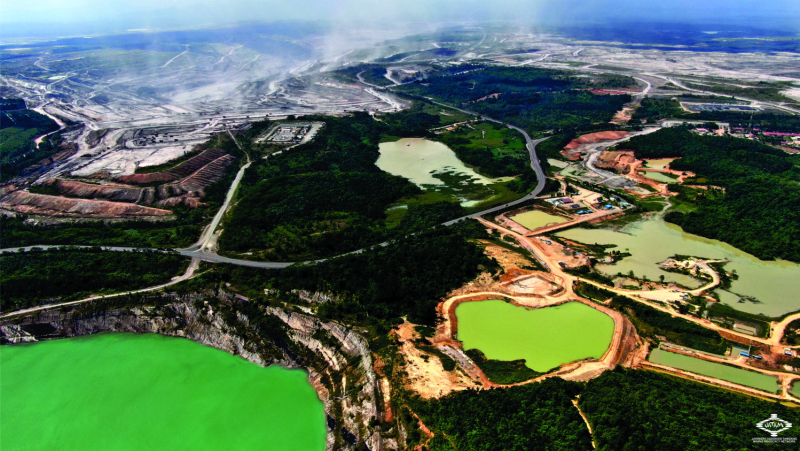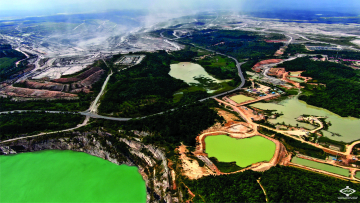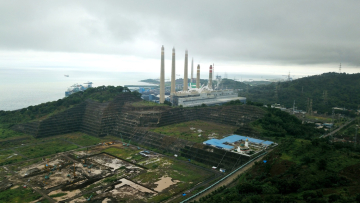
Project – Active
This profile is actively maintainedBankTrack
Camilla Perotti, Banks and Coal Campaigner

Project – Active
This profile is actively maintainedBankTrack
Camilla Perotti, Banks and Coal Campaigner
Why this profile?
This announced captive coal plant, which will power a new aluminium smelting facility, is the most climate-damaging project currently being developed by Indonesian coal giant Alamtri Resources Indonesia. This captive coal plant is also significant because it represents the trend of metal-smelting industrial projects being promoted as sustainable, despite being powered by coal.
What must happen
Commercial banks should divest their financing from this project, which is likely to become a stranded asset and represent a demeaning reputational risk for the financial institutions involved. Banks should also entirely rule out Alamtri as a client, as it is responsible for severe negative impacts on the human rights of communities and Indigenous peoples, Indonesian biodiversity, and the climate. Companies like Hyundai, the South Korean automaker, have already distanced themselves from this project. Other companies that may agree to buy the aluminium being produced by this facility, must commit to procuring their metal products from sustainable sources that are not implicated in the displacement of communities, risks to ecosystems, and massive greenhouse gas emissions.
| Sectors | Coal Electric Power Generation , Coal Mining |
| Location |
|
| Status |
Planning
Design
Agreement
Construction
Operation
Closure
Decommission
|
This project is a captive coal power plant located in the 30,000-hectare Kalimantan Industrial Park Indonesia (also called the Kaltara Industrial Park, KIPI or KIHI in Bahasa Indonesian). The so-called ‘green’ industrial park will contain the captive coal plant as a means of powering an industrial aluminium smelter and is touted to be the largest industrial park of its kind in the world. It is being built at the expense of local biodiversity, coastal erosion, and air pollution, as well as loss of livelihood and decline in incomes of people employed in agriculture, livestock, and fisheries in North Kalimantan.
The aluminium smelter will progressively ramp up over three phases, with commercial operations date for each phase scheduled for 2025, Q4 2026, and Q4 2029, respectively. Each phase will add a production capacity of 500,000 tonnes of aluminium per year. While Phase I, consisting of four coal power units of 275 MW each, is already under construction, Phase II, which would add 1100 MW more, is currently still seeking finance. The third phase of the project’s life will be powered by the Mentarang Hydropower Project, a vast new complex of five hydropower dams built on the Kayan River, 200km north of the industrial park, by PT Kayan Hydro Energy, a joint venture that includes Alamtri. The five dams, part of China’s Belt and Road Initiative, will have 1.3GW generation capacity and cost over USD 2bn to build. Planned to be online by the third phase of the smelter’s life, the hydropower project will therefore begin to power the smelter in late 2029, four years after the smelter’s projected start date of 2025. This is significant because the smelter project’s developer, PT Adaro Minerals Indonesia Tbk (AMI), an Alamtri subsidiary, has touted the project’s sustainable and “green” credentials on the basis of its hydropower energy source. Indonesian environmental advocates have accused Alamtri of greenwashing by downplaying the fact that coal will be instrumental for two of three phases of the project.
The project also requires the development of a vast web of infrastructures, including a large port to accommodate ships hauling materials and goods to and from the remote industrial park, with further potential for adverse impacts on climate, nature and human rights.
Impact on human rights and communities
No public environmental impact assessments are yet available for the project, although land-clearing operations have already commenced. The project's location within an industrial park does not preclude impacts on nearby communities, given the range of developments associated with transporting the coal and aluminium to and from the park. Aside from the land- and forest-clearing necessitated by the plant, there will also be extensive construction for worker accommodation and a jetty at the coast for transporting materials.
Displacement The Mentarang Hydropower project, which will power the smelter in later years, is also likely to have severe impacts on communities throughout North and East Kalimantan, including the inundation of Long Lejuh and Long Peleban villages, which will force 160 households or around 2000 people to relocate and jeopardise the livelihoods of local fisherpeople. This is in addition to its impacts on nature, set out below.
Loss of livelihood The local communities rely mostly on the fishing industry. Since the development of the industrial park has begun, they have lamented a decrease in fish along the coast, as the increase in ship traffic delivering supplies to this remote area is driving fish away. Local fishermen on small wooden boats are forced to fish further away from the coast to keep making an income. Although the industrial park may bring job opportunities for some local residents, communities fear that it will mostly threaten the traditional streams of income: fishing, farming, and, growingly, eco-tourism, as water and air pollution, coal-fired power plant fly ash, noise pollution, coal and fuel sea spills are real threats to these industries.
Impact on climate
Carbon emissions With a generation capacity of 1.1 gigawatts (GW), the emissions from the captive coal plant would emit 5.2 megatonnes of carbon dioxide-equivalent greenhouse gas emissions (Mt CO2-e) per year, the equivalent of the annual emissions of 1.13 million cars. Details on the exact size and capacity of the plant have yet to be confirmed. Given that the project will progressively increase its aluminium output each year, the energy demand from (and therefore the climate impact of) the coal plant will also ratchet up over time. This is until the envisioned hydropower project replaces coal as the smelter’s energy source.
Greenwashing The KIPI park and its coal-fired aluminium smelter have been repeatedly criticised as a massive greenwashing exercise. Activists have argued that international finance for the project risks accepting the tenuous “green” credentials of the project, and thereby condoning broader development of Indonesia’s less populated islands. At a time when international support is flowing simultaneously to Indonesia's renewable energy transition, international companies and investors must recognise that this project and the climate burden it poses runs counter to Indonesia's ambitions to reach net zero emissions.
Impact on nature and environment
Soil and freshwater pollution There are significant potential risks to local soil and freshwater resources from the park and the smelter. Media reports emphasise the remote, pristine nature in which the massive park will be located, describing it as on "the road to nowhere", a two-hour boat journey from the capital, and in which construction activity has already begun.
Deforestation and destruction of habitats Significant land-clearing has been undertaken at the industrial park site; President Joko Widodo initially estimated 16,400 hectares of land will be used, but the park could ultimately expand to 30,000 hectares, roughly half the size of Jakarta. This is happening on an island with few human settlements and vastly covered by luscious tropical rainforest, the habitat of numerous native endangered species, such as the Bornean orangutan, the Bornean bay cat, and the Bornean white-bearded gibbon. The coastal area where the industrial park is being developed is also a conservation and migration area for green turtles (endangered), hawksbill turtles (critically endangered) and killer whales.
The industrial park will require the construction of large jetties to accommodate the transport of materials to and from the plants. Its developers have sought USD 1 billion for two jetties on the nearby coast for this purpose. It is unclear how increased maritime activity associated with the massive industrial park will impact nearby marine life. Similarly, the massive hydroelectric project noted above is being developed on 5,000 hectares of forest land, and is expected to cause large-scale environmental damage through that greenfield development.
The wider Kalimantan Industrial Park (KIPI) industrial park is being developed by a consortium of Indonesian, Chinese and Emirati companies, while Alamtri reportedly approached a number of international banks to finance the captive coal project.
Reportedly, the project struggled to raise the necessary funds, with major global banks, including Singapore’s DBS and OCBC and the UK’s Standard Chartered, ruling out finance for this specific project.
On 12 May 2023, Phase I for the smelter reached financial close. The four largest Indonesian banks (Bank Negara Indonesia, Bank Mandiri, Bank Rakyat Indonesia, Bank Central Asia) and Permata Bank (majority-owned by Bangkok Bank) were confirmed as the financiers. They provided two loans, worth 2.5 trillion rupiah (USD 166.8 million) and USD 1.5 billion, respectively.
Phase II, which will see the addition of 1100 MW of captive coal power capacity, is still seeking finance.
In 2022, Adaro Minerals Indonesia signed a non-binding Memorandum of Understanding (MoU) with Hyundai for the Korean steel automaker to purchase the plant's aluminium, to be used in the production of EV vehicles. Hyundai's involvement in the project has been criticised as being out of step with the company's sustainability ambitions. In April 2024, a massive social media campaign, promoted by activist group KPOP for Planet and addressed at Hyundai, pushed the Korean automotive company to severe a deal with Adaro for the purchase of the aluminium produced at the North Kalimantan smelter. Since the smelter will rely on coal for at least the first five years of operations, Hyundai declared that this would have violated its carbon-neutrality principles.
2024
2024-04-02 00:00:00 | Hyundai exits aluminium deal with Adaro
Hyundai, the South Korean automaker, has announced that it has ended its deal with Adaro to buy aluminium supplied by the North Kalimantan smelting project. Media reports attribute the decision in large part to a campaign by K-POP fans against Hyundai's relationship with Adaro.




